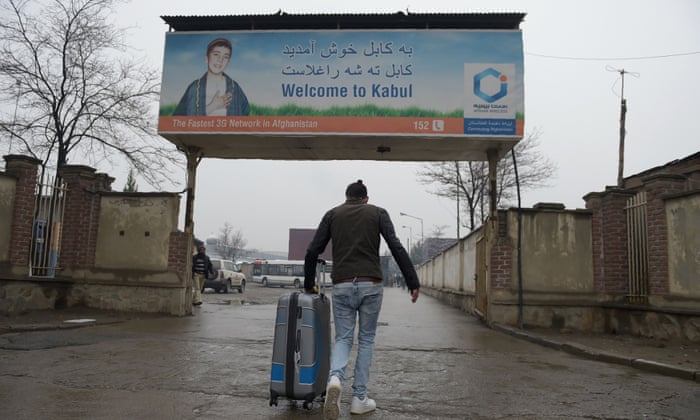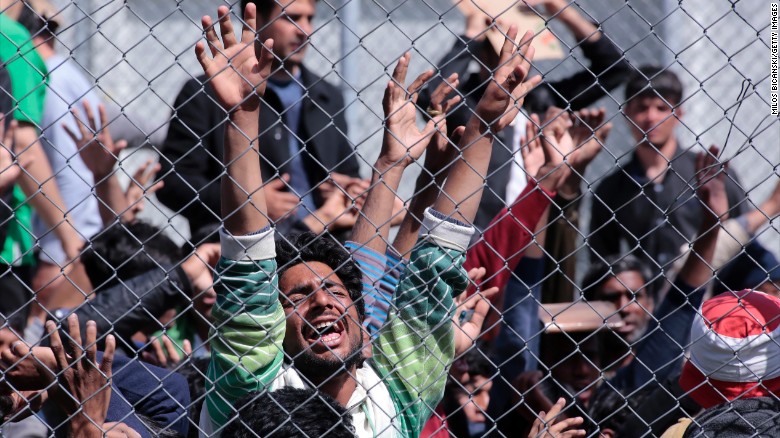No Need for Muslim Nations to be Responsible to their Populations, Europe can Absorb them Ad Infinitum
"We have security problems. We have economic problems. We have 1.6 million refugees back from Pakistan and Iran."
"We have signed the deal [agreement with European donor nations that Afghanistan must agree to accept all failed asylum applicants] and we are co-operating but we have requested again and again that Europe review its Afghan policies."
Hafiz Ahmad Miakhel, spokesman, Afghan Ministry of Refugees and Repatriation
"They [his extended family] sold their fields so I could get the money to leave. They were so happy I would be far away and safe."
"When I got there [returned to Kabul his application for asylum in Germany denied], everyone hated me. They kept asking why I had come back and what I had done with the money."
"This time he [his father] wants me to take my younger brothers, but they would never survive what I went through,"
"The police beat us badly in Serbia. It was awful. I can't let them come with me, but I know in the end he is going to force me to go and try again."
Abdul Samed, 23, Konar Province, Afghanistan
 |
| An Afghan refugee who was deported from Germany arrives in Kabul. Photograph: Wakil Kohsar/AFP/Getty Images |
Afghanistan throughout much of its history has been occupied by one nation after another; Britain and Russia played a conquest game challenging one another along with Iran and India over Afghanistan, as a gateway to riches. Afghanistan was not their goal but it was a route for them. Battered by foreign forces for centuries, little wonder Afghanistan has a dread of foreign troops setting up shop, but as a solution to the terror reign of the Taliban the NATO and UN coalition led by the U.S. was accepted as the only way their violent and corrupt Islamist regime could be ousted.
And nor would that coalition have been the least bit interested in freeing Medieval-era Afghanistan from the grip of the Islamofascist Taliban if it hadn't been for the fact that Taliban leaders were hosting another Islamist fundamentalist group of jihadi terrorists, al-Qaeda, whom the United States sought to put out of business after the al-Qaeda-sponsored airplane attacks on the World Trade Towers in New York, the Pentagon in Washington and the downed plane in Pennsylvania, killing thousands of Americans.
Afghanistan, led by its Northern Alliance tribal groups under the aegis of the foreign presence battling the insurgents, saw an influx of aid workers, humanitarian groups, foreign authorities along with the militaries that remained in an international effort to rout the Islamist terrorists, was provided with international funding and given extensive training by Western-sourced civil groups in proper civil administration of health units, education, governance, policing, incarceration, justice and other indices of normal, modern and democratic practices.
Nothing, however could make a dent in the traditions of inequality, corruption and mismanagement. And while the foreign presence was in place and funding flowed, there was opportunity for employment and a trickle-down of economic boom-times, the workforce reflecting an artificial economy and with it hopes for the future. The country, however, remains mired in poverty, corruption and war-lordism, a backwater of unremitting misery that is more reliant on illicit poppy production than the promise of extracting the mineral resources nature generously provided it with.
Its proximity to Pakistan has never helped Afghanistan, for with a plotting neighbour and its never-ending efforts to control the poorer nation in its hostility toward India which it views as an opponent for authority and patronage there, it has been responsible for the flexibility of the Taliban, offering it haven from which to launch attacks against the country it once ruled. The victims in all of this intrigue is always the most vulnerable; the farmers pressed by the Taliban to produce poppies for opium products to profit from.
Afghans are in thrall to a never-ending source of vicious destabilization which has its origins in Islam. As such, the population is victimized endlessly, forced to live in fear and misery. Syria's situation is yet another facet of the same dysfunction stemming from tribalism, conflict and sectarian tribulations of ancient animosities. When Afghans realized that Syrians were being welcomed in Europe as refugees, they saw their situation little different from that of the Syrians and decided they too would make the opportunity for themselves to find haven and a future of opportunities in Europe.
Young Afghan men, urged on by their families travelled thousands of kilometres across Turkey and Eastern Europe, no legal travel documents in their possession, their plans exclusively to find asylum in the West where they were convinced their future beckoned. The initial empathy and welcome soon wore thin as the trickle became an endless flood and Europe realized it was being swamped, its own stability threatened just as surely as its culture and heritage was.
Over 200,000 Afghans reached Western Europe in 2015, 80 percent of whom were asylum applicants, receiving temporary shelter in affluent welfare-type states like Germany, Austria and Sweden, given lodging and language lessons and feeling free. Until the tide turned and German Interior Minister Thomas de Maiziere announced most Afghan asylum seekers would be rejected, that many among them were middle-class Kabul residents who had an obligation to "remain and help build (their) country up".
 |
| Refugees from Afghanistan and Pakistan protest against their deportation to Turkey on April 5, 2016 in Lesbos, Greece. An unlimited number of migrants will soon be returned to Afghanistan from the EU |
Labels: Afghanistan, Europe, Haven, Islamism, Migrants, Refugees, Syria, Terrorism
0 Comments:
Post a Comment
<< Home